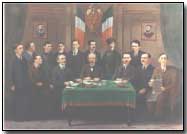In an article from The Mayo News dated 23 May 2007, it recalls:
May has been a memorable month in Ireland. Who would have believed, some years
ago, that the Democratic Unionist Party and Sinn Féin would agree to work in
government in Northern Ireland; or that Dr Ian Paisley and An Taoiseach, Mr
Bertie Ahern, would make a joint visit to the site of the Battle of the Boyne as
a mark of reconciliation?
Mr Ahern’s address to the Houses of Parliament in
London followed these ground-breaking events and expressed abundantly the
present amicable state of Anglo-Irish relations.
In his play, The Cure at
Troy, Seamus Heaney writes:
“History says, don’t hope
On this side of the
grave.
But then, once in a lifetime
The longed-for tidal wave
Of
justice can rise up,
And hope and history rhyme.”
Hope and history have
rhymed in Ireland in recent weeks.
What a contrast with an unsavoury incident
in the small Wexford village of Fethard-on-Sea 50 years ago. A drama that
attracted national and international headlines centred on the lives of a young
married couple, Seán and Sheila Cloney. Seán was a Roman Catholic and Sheila a
member of the Church of Ireland. When they married, Sheila, under some duress,
agreed to the terms of the Ne Temere papal decree which insisted that children
of a mixed marriage be brought up as Roman Catholics.
By 1957, their eldest
daughter, Eileen, was of school-going age. They also had a younger daughter,
Mary. The parish priest, Fr Laurence Allen, visited the home and ordered them to
send Eileen to the local Catholic school. Sheila, a high-spirited woman,
resented this pressure as she felt a deep sense of injustice about the
provisions of the Ne Temere decree.
In late April Sheila left home, without
informing her husband, and went to Belfast with the two girls. Some days later a
Belfast barrister, Desmond Toal, went to Fethard-on-Sea to inform Seán Cloney of
the whereabouts of his wife and children. He also told him she was prepared to
return to him only if he sold the farm and emigrated. Seán refused and began
legal proceedings for the return of his children.
The private difficulties of
a married couple then escalated into a public row. The curate of the parish, Fr
William Stafford, announced a boycott of local Protestant business from the
altar at Sunday Mass. Catholics stopped patronising the two local Protestant
shops; the Catholic teacher left the Protestant school; the Protestant music
teacher lost her pupils; Protestant farmers could not sell their produce or find
Catholic workers to help on their farm. Time Magazine announced an addition to
the English language - ‘fethardism: meaning to practice boycott on religious
lines’.
The row deepened when the boycott was supported by a leading member
of the Catholic hierarchy. The then Bishop of Galway, Dr Michael Browne, a man
not noted for the subtlety of his views, told a meeting in Wexford: “There seems
to be a concerted campaign to entice or kidnap Catholic children and deprive
them of their faith. Non-Catholics, with one or two honourable exceptions do not
protest against the crime of conspiring to steal the children of a Catholic
father. But they try to make political capital when a Catholic people make a
peaceful and moderate protest.”
A Catholic barrister, and later judge, Mr
Donal Barrington, counteracted this Episcopal view by calling the boycott ‘the
most terrible thing that has happened in this country since the Civil War’. The
then Taoiseach, Mr Eamon de Valera, made a dignified statement to the Dáil,
calling for an end to the hostilities.
“If, as head of the Government, I must
speak, I can only say from what has appeared in public that I regard this
boycott as ill-conceived, ill-considered and futile for the achievement of the
purpose for which it seems to have been intended, that I regard it as unjust and
cruel to confound the innocent with the guilty, that I repudiate any suggestion
that this boycott is typical of the attitude or conduct of our people and that I
beg of all, who have regard for the fair name, good repute and well-being of our
nation, to use their influence to bring this deplorable affair to a speedy
end.”
His powerful words had an effect. The boycott was called off and Seán
and Sheila Cloney were reconciled.
As I implied at the opening of this
article, we have moved on in Ireland. We still face grave problems in church and
society. Perhaps we can now bring the patience, imagination and creative
intelligence that characterised the conduct of the peace process to their
resolution?

`No Comment on the above` ie. `SPEECHLESS`....
ReplyDelete